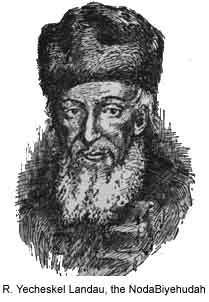Zeidy Zalman tells a tale of "Nine days of Pesach!"
Often in life, dear children, we are presented with opportunities to do acts of kindness. Though we should do them without ever asking for anything in return, a good deed is never forgotten.
The great sage, Rabbi Yecheskel Landau, known after his most famous work, Nodah Biyehuda was an outstanding personality of his generation. All of the members of his congregation in Prague had the utmost admiration and respect for him.
One day, as he was on
"What's the matter, son?" the concerned rabbi asked.
When the boy saw the kind eyes of the rabbi looking down on him, he was encouraged to open tell this man his sad story.
"My father is one of the leading bakers in Prague. My mother died when I was only a baby and my father remarried. My stepmother hates me and treats me cruelly. Every day, she beats me as soon as I enter our house."
"Today," continued the child, " I did exactly what I was supposed to do. I sold all my wares. But as I was walking home, I realized that all of my money had fallen out of my pocket. I'm scared to go home now, because I'm sure my stepmother will beat me silly."
The rabbi looked at the young child for a long moment. Sure, it could all be a scam. But the boy just seemed so earnest.
How much did lose, he finally asked.
The child named an amount that was most definitely on the steep side for a hand-out.
"Here," the sage said, "this what you need and a little extra. Buy something to eat, you look half-starved."
The child was transformed instantaneously. He thanked the rabbi repeatedly --- and then disappeared.
IT WAS THE eighth day of Pesach, many years after the above event occurred. The Nodah Biyehudah was sitting in his study immersed in deep thought, when he heard someone tapping on the door.
As soon as his visitor entered, he immediately recognized him as the child he saved from his step-mother years earlier.
The expression on his visitor's face immediately announced this was not a pleasure visit.
"Rabbi," he began, tripping over his words. "I have never forgotten your kindness when I was young and it's for that reason that I'm here today --- to repay you for all you did for me."
"As you know," he continued, "my father is a leading baker in the city. Last night, the Bishop, who is a rabid anti-Semite, called a meeting of all the non-Jewish bakers in Prague. They met in my father's house. The Bishop suggested to all there that there are too many Jews in our region and that it was time that they be wiped out.
"He promised all the bakers that they'd be guaranteed to go straight to Heaven if they agreed to take part in his plan to rid the city of every Jew."
(In those days, it was customary for Jews in Prague to buy their bread from gentile bakers on the day after Pesach.)
The Bishop then distributed a vial of poison to each and every baker, instructing each to mix it into the bread they'd bake after immediately after Pesach. This bread was to be sold only to the Jews.
As the Jews were a captured-audience, they'd all be wiped out in one day.
The sage was in total shock. He thanked the young man profusely for his kindness and then went into overdrive thinking of a way to save his people.
The next morning, a message was despatched to all the shules in Prague urging the entire community to attend a meeting to be held in the main shul at 3 p.m. that afternoon --- the 8th, and last, day of Pesach.
Silence reigned as the sage got up to speak.
"My dear people," he began, "although we fixed a date for all of our festivals, it has come to my attention that a grave error has been made in this year's calendar. Pesach should have begun a day later and we are therefore delighted to keep one extra day Pesach this year. It is therefore forbidden to eat any bread tomorrow."
The audience was astonished --- how could such a mistake have occurred? Nevertheless, out of reverence and respect for the sage, they obeyed.
Prague celebrated Pesach for nine days that year.
THE BAKERS WERE growing impatient. An extra large amount of bread had been prepared, yet not one Jewish customer entered any of their shops. A delegation stormed into the governor's office with complaints. It was eventually discovered that an extra day of Pesach had been proclaimed by the rabbi.
"But this rabbi has caused us to lose a tremendous amount of money --- all of this bread will go to waste. Let's take him to court and prosecute."
The governor immediately summoned the Nodah Biyehudah.
"I am prepared to pay for every single loaf ---- if they will only eat one bite of each."
There was a hush and all faces turned white.
The Bishop's plot against the Jews gradually emerged. The clergyman was sent to prison and the bakers were severely reprimanded.
The main shul was crowded with congregants praying to the Creator, thanking Him for saving their lives.
Their gratitude to their rabbi knew no bounds.
 his way to Shul, he encountered a young, non-Jewish, child sitting on the ground and crying his eyes out.
his way to Shul, he encountered a young, non-Jewish, child sitting on the ground and crying his eyes out.